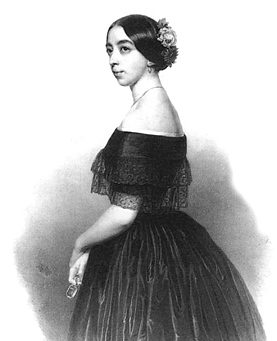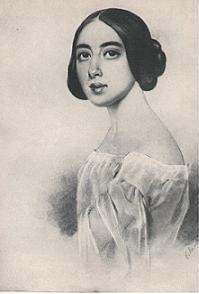One of the reasons we chose Pauline Viardot as our first featured composer was that, in her capacity as diva and salonnière, she knew pretty much everyone who was anyone in the musical scene of the time. (This also held true for the literary scene, since many famous writers also moonlighted as music critics, but of that more later.)
What this also meant was that she connects a number of composers we will be featuring in future episodes of the Eternal Feminine podcast series: she knew Fanny Mendelssohn and was a good friend of Clara Schumann. If we branch out from first-degree acquaintances, we find that her salon guests included George Alexander Osborne, an Irish pianist who later would turn out to be the uncle of Régine Wieniawska aka Poldowski, and César Franck who would later teach Augusta Holmès. A little more remotely, we find Alma Mahler (via Wagner –> Hans von Bülow –> Mahler), and Liza Lehmann (who studied with Jenny Lind, a student of Viardot’s brother Manuel Garcia). If we extend the web even further, we find that her friend Meyerbeer was a friend of Ignaz Moscheles, who taught three teachers of Charles Villiers Stanford, who taught Vaughan Williams, who in turn taught Amice Calverley.
One cannot help, though, but also marvel at the parade of eminent names that crossed Viardot’s path in general, and so we couldn’t resist leaving you with a partial (and somewhat gossipy) list:
- as a little girl, she met Lorenzo da Ponte in 1826, at the first unabridged performance of Don Giovanni in the US (her parents and older siblings were starring in it).
- she studied piano with the young Franz Liszt (and, not entirely surprisingly, had a huge crush on him).
- the poet Alfred de Musset proposed to her at one point.
- George Sand based the heroine of her novel Consuelo on her. As her friend and quasi-mentor, she also steered the young Viardot away from the volatile de Musset (whom she had experienced first-hand, having been his ex-lover), and towards the much more stable affections of Louis Viardot, the director of the Théâtre italien in Paris.
- she played duets with Chopin, who also gave her permission to arrange some of his pieces for voice and piano. Later, she would sing in the performance of Mozart’s Requiem that took place at his funeral.
- Saint-Saëns dedicated Samson et Dalila to her.
- Delacroix designed her costume for the role of Orphée in Gluck’s Orphée et Euridice.
- she sang the Act II duet of Tristan und Isolde with Wagner as Tristan at a private recital, while Berlioz sat by jealously (!!).
- Gounod, who may or may not have had an affair with her, referred to her as the “godmother” of his career.
- Meyerbeer wrote the part of Fidès in Le prophète for her.
- the Russian writer Turgenev fell madly in love with her in 1843 after seeing her in a performance of Rossini’s Barbiere di Siviglia. He promptly got an in with her by offering to coach her in Russian, and ended by having a longstanding affair with her (he lived practically next door to the Viardots for the better part of forty years, in what seems to have been a kind of unofficial ménage à trois). He wrote libretti for three of her operas, and she is also said to have inspired some of his works, such as A Month in the Country and Smoke.
– Suzanne Yeo
July 2020
Return to podcast. ↵
Can’t get enough?
Visit our Bibliography page for further sources.
Subscribe to our Newsletter!

